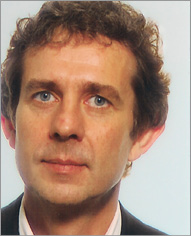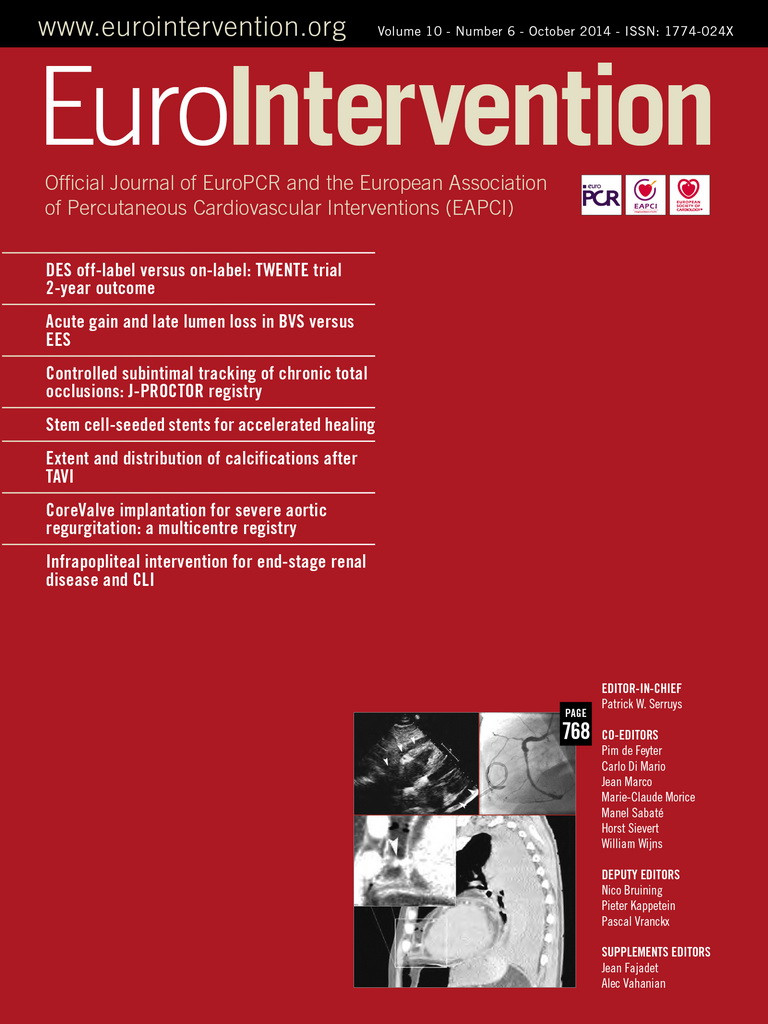NEWS
■ The EAPCI Women Committee was created to attain gender equality at the professional and patient level. If you would like to volunteer, provide support and contribute to this mission, please contact [email protected].
■ EAPCI is proud to announce the joint publication of two papers with other ESC Associations: Cardiac arrhythmias in acute coronary syndromes: position paper from the joint EHRA, ACCA, and EAPCI task force and the EHRA/EAPCI expert consensus statement on catheter-based left atrial appendage occlusion. Available at EuroIntervention online.
■ Stent for Life was recognised at the ESC Congress 2014 when Prof. Petr Widimsky, one of the SFL founders and its first Chair was awarded the ESC Gold Medal, for his work transforming the STEMI care systems in Europe and beyond by promoting primary PCI through the PRAGUE studies and SFL.
■ Not yet an EAPCI Member? Join us today online.
EAPCI Focus on the Belgian Working Group of Interventional Cardiology (BWGIC)
An interview with the President, Walter Desmet
What does the EAPCI membership mean for a national society?
As things stand today, we need to improve our participation in the EAPCI by promoting the EAPCI within Belgium. We promote the ESCeL platform for our trainees, but not all have signed up. We notice that the ties between the EAPCI and the national societies are improving, something which is reflected in the greater demand to be actively involved in the organisation of EuroPCR. We should also recognise that the EAPCI is a voluntary body whose board members give their time to help improve European interventional cardiology, trying to reach interventionalists across Europe. To have the maximum impact, familiarity with the EAPCI should be at its highest within Europe and to this end we actively and positively support the EAPCI.
What are the current issues related to the national society?
Our working group was founded in 1996 and currently has 180 members. Our main activities are twofold: firstly, we safeguard the quality of interventional cardiology in Belgium and, secondly, we help in the dissemination of scientific data.
We are legally required to peer review the different interventional cardiology centres within Belgium. However, there is no real funding for this aspect of the Working Group’s mission, so, in fact, Board members voluntarily organise these reviews, resulting in reviews which are not in as much depth as we would like. Adequate funding for the peer review process of Belgian sites is one of our most pressing objectives.
We also organise our own scientific meeting as a yearly spring event taking place in June, as well as dedicated sessions within the Belgian Cardiology Society meeting. On an international level, we organise a session at both EuroPCR and TCT. In addition, we lend our support to several scientific meetings within Belgium, but it is only after careful and detailed scrutiny of their scientific programmes that these meetings can be formally endorsed by our Working Group. These meetings are generally organised by academic institutes and sometimes companies. For our Working Group, it is important that these meetings provide a high level of academic discourse and avoid commercial interests.
With respect to our relationship with the Ministry of Health, we are in lengthy discussions with the authorities and, in particular, the reimbursement committees regarding several technologies and treatments. We have the feeling that Belgium is lagging behind somewhat when we compare our situation to that of other neighbouring countries. For instance, we are still seeking decent reimbursement for TAVI therapies. The authorities’ proposals are very limited and hence unsatisfactory for the majority of centres. Concurrently, we are also seeking adequate reimbursement for other technologies and treatments such as FFR and transcatheter mitral valve interventions.
Another aspect of considerable interest is our databases. We have organised a database for PCI and also primary PCI and probably soon TAVI therapies. Our initial database was established in 2002 and was in fact hosted at the ESC’s Heart House in Nice. Since then, the Belgian authorities requested that the database be moved to Belgium and be incorporated within the national general health database. However, it became difficult to extract interventional data from this database, leading us to set up a new interventional database three years ago, something which was quite painful. Nonetheless, we hope in the near future to crosslink these interventional databases with the national population registry in order to gain more insight into post-interventional procedure mortality rates. Database analysis will become increasingly important and, of course, can be a valuable asset in our peer review tasks as well as for issues in reimbursement.
Another obstacle in our path is the fact that our subspecialty is not recognised in Belgium. It is quite strange in Belgium that, for example, after two years of additional training, rehabilitation doctors are recognised, but not interventionalists. It is noteworthy that Belgian interventional trainees generally stay at home as our centres provide top level education with requirements of a minimum of two years of experience, including clinical research, to complete their training. We also have a relatively large group of foreign trainees spread across Belgium, mostly Europeans.

Walter Desmet, President of the Belgian Working Group of Interventional Cardiology
![]()
President: Walter Desmet
Contact details: [email protected]
Website: www.bscardio.be
Upcoming annual meeting: Friday June 12th 2015, in Antwerp
Founded: 1996
Members: 180
EAPCI members: 85

